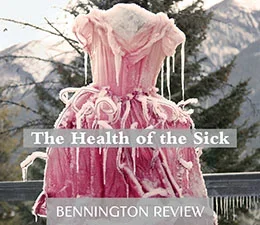Bennington Review, Issue Nine: The Health of the Sick
Bennington Review—a national biannual print journal of innovative, intelligent, and moving poetry, fiction, creative nonfiction, and film writing housed at Bennington College—has released its ninth issue, around the theme of “The Health of the Sick.”

From the editor's note, by Editor Michael Dumanis and Managing Editor Katrina Turner:
"In 2019, the theme of the 58th International Art Exhibition organized by the Venice Biennale was 'May You Live in Interesting Times,' a curse invented a century ago by Western diplomats and falsely attributed to ancient Chinese culture. The prescient exhibition, curated by Ralph Rugoff, focused our attention on the digital dissemination of fake news and alternative facts, on the abyss of contemporary misinformation and uncertainty. The nuanced, subtle curse, analogous in some ways to the insincere tongue-in-cheek syrupiness of the Southern 'bless your heart,' greeted the international art tourist on colorful signage throughout the massive exhibit. It would be a sarcastic understatement to say two years later that the entire world population is indeed living in interesting times.
"The 2021 Biennale did not take place, and has been rescheduled for 2022 under the optimistic presumption that the pandemic presently continuing to disrupt and ruin would abate sufficiently for a global artist gathering. In the Biennale’s history, only four exhibitions had to be canceled, two because of the First World War and two because of the Second. Meanwhile, our war with the virus continues. For a while there, after the emergence of vaccines, victory over the pandemic seemed to be in sight, was even declared by hopeful statesmen. More recently, Andy Slavitt, the former White House Senior Advisor for COVID Response, tweeted that 'given Delta’s contagiousness & the fitness of future mutations in order to beat it, this means SARS-CoV-2 will be contagious enough that everyone will get the virus.' At this time, the pandemic seems to be becoming, at least for the time being, endemic, a fundamental fact in our lives that we can take preventative measures against or ignore or blithely deny, but one that continues to alter our understanding of what we value, what we need, how we treat others, what we are willing to do without, what risks we see as reasonable. One of my daughter’s first words, delivered with all the exuberance of linguistic discovery, was 'mask.'
"Many of the pieces in this issue of Bennington Review display a keen awareness of the vulnerability of the human body, physically, emotionally, and psychologically. Unsurprisingly, while it may be challenging to look at the present health crisis with fresh eyes and view it through an unexpected lens, there has been a proliferation of brilliant writing about fragility and catastrophe, wellness and illness, mental stability and instability, the health of the individual and the health of the planet as a whole, resolve and despair.
"The theme of this issue borrows its title from Argentine writer Julio Cortázar’s underappreciated 1966 short story 'The Health of the Sick,' which appears in his collection Todos los fuegos el fuego (All Fires the Fire). In it, the family matriarch is unwell. When her son dies in a car accident, relatives go to extreme lengths to shield her from terrible news, pretending he merely left for a lucrative job abroad. When she doesn’t understand why he can’t come and visit, they invent a diplomatic conflict between the two countries that is causing the border to close. They fabricate letters from the dead son to his dying mother, and then transcribe the dying mother’s responses, facilitating a conversation between the dying and the dead. They don’t realize that the matriarch is in fact fully aware of what has transpired, but allows her family to continue the charade, touched as she is by its kindness. When she finally passes on, her daughter starts imagining how she will break the news to her dead brother that their mother has died.
"The cover of this issue is a photograph of part of a larger installation by Canadian environmental multimedia artist Nicole Dextras, a pink party dress overtaken by icicles and frost, no longer functional but dazzling and arresting in its texture and color against the drab gray day surrounding it like a bizarre carnivorous flower. All dressed up with nowhere to go, waiting for a thaw, the people of this world continue to imagine, provoke into being, and experience works of staggering power and beauty. We live in interesting times, Reader. Be well."
This issue features contributors from Bennington alumni J. Mae Barizo MFA '13, Sydney Bradley '18, Layne Eckensberger '17, Jill Eisenstadt '85, Frances Revel '17, and Devon Walker-Figueroa '15, as well as poetry faculty member Phillip B. Williams, who has both a new poem from his new book Mutiny and a back-and-forth interview with poet Donika Kelly.
The issue also has work by Pulitzer Prize finalist Lore Segal; former Vermont Poets Laureate Chard deNiord and Sydney Lea; National Book Award finalist Leslie Harrison; and Griffin Poetry Prize winner Valzhyna Mort; as well as prose by Olivia Clare, Cara Hoffman, Daniel Barban Levin, and Emily Mitchell; and poetry by Polina Barskova, Cynthia Cruz, Jon Davis, Jay Deshpande, Eyrn Green, Elisa Gabbert, Suphil Lee Park, Barry Schwabsky, and Sandra Simonds.